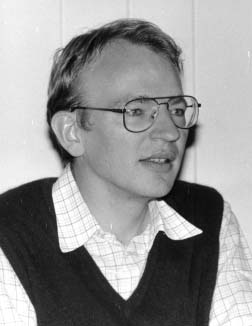
Gerd Faltings
 المؤلف:
Biography in Encyclopaedia Britannica
المؤلف:
Biography in Encyclopaedia Britannica
 المصدر:
Biography in Encyclopaedia Britannica
المصدر:
Biography in Encyclopaedia Britannica
 الجزء والصفحة:
...
الجزء والصفحة:
...
 24-3-2018
24-3-2018
 787
787
Born: 28 July 1954 in Gelsenkirchen-Buer, Germany

Gerd Faltings studied for his doctorate at the University of Münster, being awarded his Ph.D. in 1978. Following the award of his doctorate, Faltings went to the United States where he spent a year doing postdoctoral work as a research fellow at Harvard University in 1978-79.
In 1979 Faltings returned to Germany, taking up an appointment as professor of mathematics at the University of Wuppertal. In 1985 Faltings was appointed to the faculty at Princeton.
Faltings proved conjectures by Mordell, Shafarevich and Tate during 1983. In the same year he received the Danny Heinemen Prize from the Akademie der Wissenschaften, Göttingen.
In 1986 Faltings received the highest honour that a young mathematician can receive when he was awarded a Fields Medal at the International Congress of Mathematicians at Berkeley. At the Congress B Mazur gave an address describing the work by Faltings which had led to the award. He received the medal primarily for his proof of the Mordell Conjecture which he achieved using methods of arithmetic algebraic geometry.
Faltings has been closely linked with the work leading to the final proof of Fermat's Last Theorem by Andrew Wiles. In 1983 Faltings proved that for every n > 2 there are at most a finite number of coprime integers x, y, z with xn + yn = zn. This was a major step but a proof that the finite number was 0 in all cases did not seem likely to follow by extending Falting's arguments. However, Faltings was the natural person that Wiles turned to when he wanted an opinion on the correctness of his repair of his proof of Fermat's Last Theorem in 1994.
In 1994 Faltings left Princeton when appointed a Scientific Member of the Max Planck Institute for Mathematics in Bonn, Germany. In the following year he became the Director of the Institute, a position he continues to hold. In 1996 he was awarded the Gottfried Wilhelm Leibniz Prize of the Deutsche Forschungsgemeinschaft. This is the largest German research prize and it consists of a research grant of 2.5 million euro, to be used within seven years. Let us quote Faltings' own description of his research interests:
My main interests are arithmetic geometry (diophantine equations, Shimura-varieties), p-adic cohomology (relation crystalline to étale, p-adic Hodge theory), and vector bundles on curves (Verlinde-formula, loop-groups, theta-divisors).
Contribution to research area "Moduli spaces":
I constructed arithmetic toroidal compactifications of the moduli space of abelian varieties. I showed that the moduli space of bundles on curves can be projectively embedded by explicit theta-functions. I proved the Verlinde formula for the dimension of the space of such functions. I constructed moduli spaces for bundles on nodal curves, and I found resolutions of their singularities. I hope to construct semistable models for Shimura varieties in the case of tame bad reduction. Furthermore I search for an explicit description of theta-divisors on moduli spaces of G-bundles, especially for exceptional groups G, especially for type E8. I have shown that for this group there exists a unique canonical theta-divisor. Also for spin groups of dimension divisible by four there should exist explicit theta-divisors associated to the two spin representations. I am looking for geometric descriptions of these divisors.
Contribution to research area "Automorphic forms: Global analysis and arithmetic":
I have constructed an explicit isomorphism between infinite coverings of two p-adic moduli spaces (studied by Drinfeld), using p-adic Hodge theory. This gives an explicit realisation of the Jacquet-Langlands correspondence, as was conjectured by Carayol. I try to extend this to other cases, by employing my expertise in p-adic cohomologies which I developed in the last fifteen years.
Contribution to research area "Groups of automorphisms":
I have studied algebraic loop groups, and proved the normality of Bruhat cells even in positive characteristics. As the corresponding affine Grassmannians uniformize moduli spaces of bundles this has applications to such spaces. I constructed on them a line bundle of central charge one, which was an open problem even in positive characteristics. I hope to construct explicit sections of these bundles.
- Biography in Encyclopaedia Britannica.
http://www.britannica.com/eb/article-9086204/Gerd-Faltings
Articles:
- H H Andersen, Why Gerd Faltings got the Fields medal (Danish), Normat 35 (3) (1987), 89-97; 128.
- B Mazur, On some of the mathematical contributions of Gerd Faltings, Proceedings of the International Congress of Mathematicians, Berkeley 1986 1 (Providence, RI, 1987), 7-12.
- L D Olson, Mordell-Faltings' theorem (Norwegian), Normat 32 (3) (1984), 125-127.
- F Oort, In 1983 Faltings proved conjectures by Mordell, Shafarevich and Tate, CWI Newslett. (5) (1984), 2-21.
- S Saito, The contributions of Gerd Faltings (Japanese), Sugaku 39 (1) (1987), 25-32.
 الاكثر قراءة في 1940to the present
الاكثر قراءة في 1940to the present
 اخر الاخبار
اخر الاخبار
اخبار العتبة العباسية المقدسة


